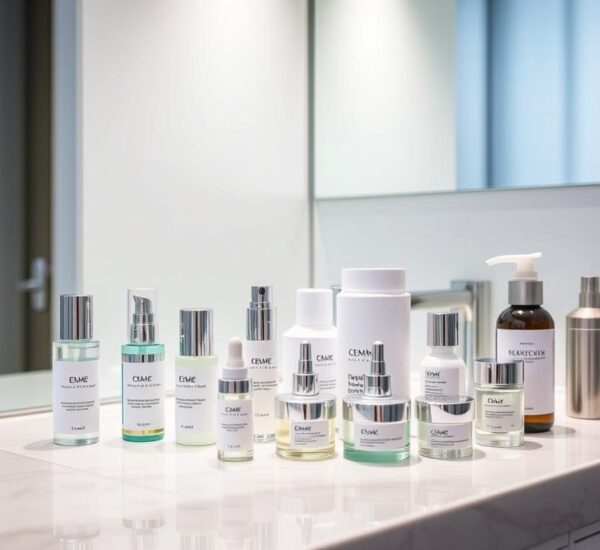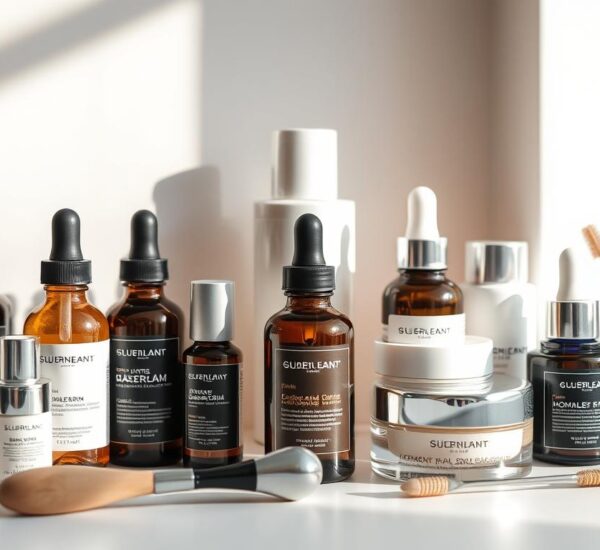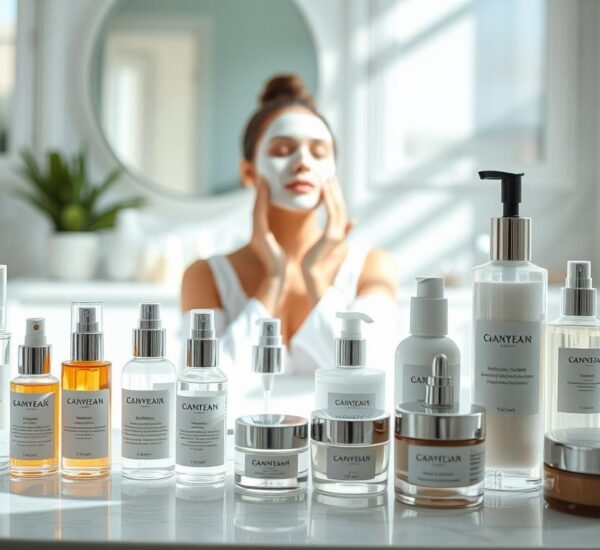Are you tired of dull, lackluster skin? Do you dream of having a radiant, glowing complexion that turns heads?
Achieving smooth, glowy skin requires more than just a good skincare routine; it demands a complete approach. This includes the right skincare routines and makeup tutorials.
We will explore the top beauty tips to help you get a flawless, glowing complexion. We’ll cover everything from understanding your skin type to using the right products.
Key Takeaways
- Understand your skin type to create a personalized skincare routine
- Learn effective makeup techniques for a flawless look
- Discover the importance of consistency in your skincare routine
- Explore natural remedies for a radiant glow
- Find out how to choose the right products for your skin concerns
Understanding Your Skin Type
Knowing your skin type is key to a good skincare routine. It helps you choose the right products for your skin. This can solve problems like acne, dryness, or dark spots.
Identifying Your Skin Type
To find out your skin type, look at its features.
- Normal skin is balanced, not too oily nor too dry.
- Dry skin feels tight and may look dull.
- Oily skin has too much oil, leading to big pores.
- Combination skin is a mix, oily in the T-zone and normal to dry elsewhere.
Common Skin Issues and Solutions
Many people face acne, dark spots, and fine lines.
- For acne, use products with salicylic acid or benzoyl peroxide.
- Dark spots can be treated with vitamin C serums and niacinamide.
- Fine lines and wrinkles can be lessened with retinol and regular moisturizing.
Daily Skincare Routine Essentials
A good daily skincare routine is key to healthy, glowing skin. Knowing the basics and choosing the right products for your skin type is important. This section will cover the main parts of a daily skincare routine and the essential products for each skin type.
Morning vs. Night Routine
Your morning and night skincare routines should meet different needs. In the morning, focus on protecting and preparing your skin. Cleanse, apply a light moisturizer, and don’t forget to use a broad-spectrum sunscreen with at least SPF 15.
At night, your routine should repair and rejuvenate your skin. Start with a deep cleanse to remove dirt and makeup. Then, apply a serum and moisturizer rich in vitamin C and hyaluronic acid.
Must-Have Products for Every Skin Type
Every skin type needs certain products for a good skincare routine. These include a gentle cleanser, a moisturizer that fits your skin type, and a broad-spectrum sunscreen.
If you have specific skin issues like acne or aging, serums and exfoliants can help. It’s important to pick products made for your skin type to get the best results.
| Product | Normal Skin | Dry Skin | Oily Skin |
|---|---|---|---|
| Gentle Cleanser | Foaming cleanser | Cream cleanser | Gel cleanser |
| Moisturizer | Lightweight lotion | Rich cream | Oil-free moisturizer |
| Sunscreen | SPF 30, lightweight | SPF 30, moisturizing | SPF 30, oil-free |
By adding these essentials to your daily skincare routine, you can get a radiant, protected look. Remember, being consistent is key. Stick to your routine and make changes as your skin needs.
Makeup Tips for a Flawless Finish
We all want to look radiant, and makeup can help. The right techniques and products can give you a flawless finish. This boosts your confidence and highlights your best features.

Foundation Application Techniques
Foundation is key for a flawless look. A luminous foundation adds a glow to your skin. It makes your skin look healthy and vibrant.
Start by prepping your skin with a primer. Then, use a foundation brush or beauty blender. Apply the foundation in light strokes, starting from the center and blending outwards.
Enhancing Natural Beauty with Makeup
Makeup is not just for covering up. It’s about highlighting your features. Use a highlighter on your cheekbones, nose, and cupid’s bow for a natural glow.
Makeup tutorials offer great tips for a flawless finish. By following these and practicing, you can improve your makeup skills. This enhances your natural beauty.
- Choose products that suit your skin type and tone.
- Blend, blend, blend – it makes all the difference in achieving a natural look.
- Practice makes perfect; don’t be discouraged by initial attempts.
Nutrition for Healthy Skin
The food we eat and how we stay hydrated greatly affect our skin’s health and look. Eating foods rich in nutrients helps our skin stay healthy. Drinking enough water keeps our skin moist and plump.
Foods to Include in Your Diet
Eating foods full of antioxidants and omega-3 fatty acids is good for our skin. Berries, leafy greens, and fatty fish like salmon are great options. They fight off free radicals and help our skin stay flexible. For more info on nutrient-rich foods, check out superfoods for strong nails that also benefit your skin.
Importance of Hydration
Drinking enough water is key for keeping our skin hydrated. Aim for at least eight glasses of water a day to keep your skin looking great. Also, using a hydrating moisturizer helps keep moisture in and supports the skin’s natural barrier.
By eating well and staying hydrated, we can get a healthier, more glowing complexion. It’s about making choices that help our skin from the inside out.
The Role of Sun Protection
Sun protection is key to keeping our skin healthy and looking good. We’ll look at how to shield our skin from the sun’s harmful rays. This will help us keep our skin looking healthy and bright.
Selecting the Appropriate Sunscreen
Finding the right sunscreen is very important. We suggest using a broad-spectrum sunscreen with at least SPF 15. This protects against UVA and UVB rays, which can harm our skin and cause early aging.
- Choose a water-resistant sunscreen if you’ll be outside for a long time or sweating a lot.
- Think about your skin type when picking a sunscreen. For example, those with sensitive skin might prefer mineral-based sunscreens.
- Remember to put sunscreen on often-forgotten spots like the tops of your ears and the back of your neck.
Practicing Year-Round Sun Safety
Sun safety is important all year, not just when it’s sunny. UV rays can go through clouds, so we need to protect ourselves all the time.
- Put on sunscreen every two hours or right after swimming or sweating.
- Wear clothes that protect you, like hats and sunglasses, to cover up.
- Stay in the shade, mainly when the sun is strongest (10 am to 4 pm), to avoid too much sun.
By following these tips every day, you can keep your skin healthy and protected from the sun all year.
Hair Care and Maintenance
Hair care and maintenance are key for a radiant, healthy look that boosts our confidence. It’s not just about using any shampoo or conditioner. We need a plan that fits our hair type and needs.
Best Practices for Healthy Hair
To keep our hair healthy, we should start with gentle hair care practices. It’s important to use a gentle shampoo and conditioner that match our hair type.
Also, regular trims help prevent split ends and breakage. This keeps our hair strong and healthy.
Top Products for All Hair Types
For dry and brittle hair, a leave-in conditioner is a must. It adds moisture and protection.
Adding a hair mask once a week to our routine is also beneficial. It nourishes and moisturizes our hair, making it soft and easy to manage.
The Power of a Good Night’s Sleep
How well we sleep affects our skin’s health and look. Our body fixes damaged cells, builds bones and muscles, and boosts our immune system while we sleep. This is key for healthy skin.
Sleep’s Impact on Skin Regeneration
Not getting enough sleep can stop our skin from fixing itself. Deep sleep makes growth hormones that help fix skin cells. Not enough sleep can cause many skin problems.
Sleep also helps our skin keep moisture and stay elastic. When we’re well-rested, our skin looks bright and young. But, not sleeping well can make our skin look dull and tired.
Improving Sleep for Better Skin
To get better sleep and better skin, start a bedtime routine. This can be reading, meditation, or a warm bath. Also, make your bedroom cool, dark, and quiet for better sleep.
- Try to sleep 7-9 hours each night to help your skin heal and grow.
- Stay away from screens and electronic devices an hour before bed.
- Keep your sleep schedule the same every day, even on weekends.
By focusing on sleep and using these tips, we can boost our health and skin’s look.
Seasonal Beauty Tips
Using seasonal beauty tips can greatly improve your skin’s look all year. The weather changes, affecting our skin in different ways. For example, our skin gets dry in winter and oily in summer.
Adapting Your Routine to Different Seasons
Changing your skincare routine with the seasons is key. In summer, use light products to avoid clogged pores. In winter, use thicker, moisturizing products to fight dryness. A moisturizer with hyaluronic acid is great for keeping moisture in during winter.
Here’s a table to help you adjust your routine:
| Season | Skin Challenge | Recommended Product |
|---|---|---|
| Summer | Excess oil, clogged pores | Lightweight, oil-free moisturizer |
| Winter | Dryness, irritation | Rich, hydrating moisturizer with hyaluronic acid |
| Spring | Balancing skin after winter | Exfoliating products, vitamin C serums |
| Autumn | Preparing for dry winter | Moisturizing masks, nourishing serums |
Products to Match the Weather
Picking the right products for the weather is essential. Always use sunscreens with high SPF in summer. For a natural fix, try a homemade rosehip oil serum for anti-aging benefits.
By adjusting our skincare to the seasons and using weather-appropriate products, we can keep our skin healthy and glowing all year.
The Benefits of Regular Exfoliation
Exfoliation is a simple yet effective way to improve skin texture and reduce the appearance of fine lines and wrinkles. It helps remove dead skin cells, unclog pores, and improve skin tone. This results in a smoother, brighter complexion. By adding exfoliation to our skincare routine, we can get healthier, more radiant skin.
Types of Exfoliants to Consider
There are two main types of exfoliants: physical and chemical. Physical exfoliants include scrubs, brushes, and sponges that remove dead skin cells through friction. On the other hand, chemical exfoliants contain alpha-hydroxy acids (AHAs) or beta-hydroxy acids (BHAs) that dissolve the “glue” that holds dead skin cells together.
When choosing an exfoliant, think about your skin type and concerns. For example, if you have sensitive skin, a gentle chemical exfoliant may be better than a harsh physical scrub.

How Often Should You Exfoliate?
The frequency of exfoliation depends on your skin type and the exfoliant you use. Generally, exfoliate one to three times per week. But if you have sensitive skin, start with a lower frequency and increase it as your skin gets used to it.
Beauty Treatments and Trends to Explore
We can make our skincare better by trying different beauty treatments and keeping up with new trends. There are many ways to get a glowing, healthy face. From fancy spa treatments to easy DIY beauty, the options are endless.
Popular Spa Treatments for a Glowing Complexion
Experts say regular facials can really help your skin. Chemical peels are also great for removing dead skin, making your face smoother. To learn more about keeping your skin healthy, check out Prosper Glow.
At-Home DIY Beauty Treatments for a Fresh Look
If you like doing things at home, try face masks and scrubs. Using a facial roller can also make your skin look better and reduce wrinkles. Adding these treatments to your routine can give you a fresh, healthy look and keep you in the beauty trend loop.



